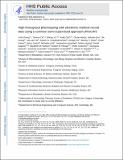High-throughput phenotyping with electronic medical record data using a common semi-supervised approach (PheCAP)
Author(s)
Zhang, Yichi; Cai, Tianrun; Yu, Sheng; Cho, Kelly; Hong, Chuan; Sun, Jiehuan; Huang, Jie; Ho, Yuk-Lam; Ananthakrishnan, Ashwin N; Xia, Zongqi; Shaw, Stanley Y; Gainer, Vivian; Castro, Victor; Link, Nicholas; Honerlaw, Jacqueline; Huang, Sicong; Gagnon, David; Karlson, Elizabeth W; Plenge, Robert M; Szolovits, Peter; Savova, Guergana; Churchill, Susanne; O’Donnell, Christopher; Murphy, Shawn N; Gaziano, J Michael; Kohane, Isaac; Cai, Tianxi; Liao, Katherine P; ... Show more Show less
DownloadAccepted version (949.9Kb)
Publisher Policy
Publisher Policy
Article is made available in accordance with the publisher's policy and may be subject to US copyright law. Please refer to the publisher's site for terms of use.
Terms of use
Metadata
Show full item recordAbstract
© 2019, The Author(s), under exclusive licence to Springer Nature Limited. Phenotypes are the foundation for clinical and genetic studies of disease risk and outcomes. The growth of biobanks linked to electronic medical record (EMR) data has both facilitated and increased the demand for efficient, accurate, and robust approaches for phenotyping millions of patients. Challenges to phenotyping with EMR data include variation in the accuracy of codes, as well as the high level of manual input required to identify features for the algorithm and to obtain gold standard labels. To address these challenges, we developed PheCAP, a high-throughput semi-supervised phenotyping pipeline. PheCAP begins with data from the EMR, including structured data and information extracted from the narrative notes using natural language processing (NLP). The standardized steps integrate automated procedures, which reduce the level of manual input, and machine learning approaches for algorithm training. PheCAP itself can be executed in 1–2 d if all data are available; however, the timing is largely dependent on the chart review stage, which typically requires at least 2 weeks. The final products of PheCAP include a phenotype algorithm, the probability of the phenotype for all patients, and a phenotype classification (yes or no).
Date issued
2019Department
Massachusetts Institute of Technology. Department of Electrical Engineering and Computer ScienceJournal
Nature Protocols
Publisher
Springer Science and Business Media LLC